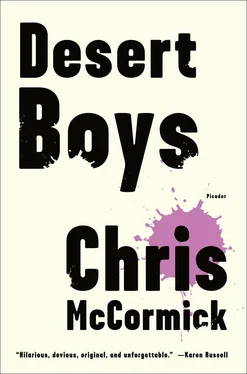“Yeah,” Watts said. “Too bad it didn’t make a difference.”
I’d remembered Karinger’s self-righteous but heroic speech, but I’d forgotten the rest of the story. Less than a week after the televised special, the girl in the headscarf was enjoying the lunch her mother had packed for her that day (a peanut butter sandwich, of all things), when she was pinned down by a group of six female seniors, who proceeded to spray-paint her white scarf red and blue. She rolled up to avoid both the fumes and the beating she presumed (understandably but incorrectly) was coming. According to Peter Thorpe’s follow-up report, she elected to be homeschooled for the remainder of high school. The six girls, who’d each been handed a five-day suspension, were initially also banned from attending senior prom. After a community petition gathered enough signatures, this additional ruling was reversed.
“I really believed Karinger’s speech was going to convince everyone on campus to leave her alone,” I said. “I went home that night and wrote this extremely sentimental note about growing up. About being proud of your friends, as opposed to just enjoying their company.”
“Sounds like you,” Watts said. “You still carry that note around, don’t you?”
“No,” I said. “I’m not that sentimental.”
The truth was, of course, I’d been even more sentimental. Years after I’d written it, after what turned out to be our last conversation, I slipped the note into Karinger’s backpack. My hope was that he’d stumble upon it after I’d gone home, understand its significance, and return to me, his best friend, inspired to make me proud again.
“I don’t know,” said Watts. “I bet you still have it.”
“Tell me about the baby,” I said. “Tell me about your godson.”
But then my phone pinged, and I saw the name — LLOYD BOOKSTORE — on the screen. I told Watts I’d call him back in a few minutes, but I ended up talking with Lloyd for a long time, an hour and a half, and meeting up with him that night at a bar, and by the time I got home, Watts may or may not have been at work or asleep, and I didn’t want to bother him either way, so I turned off my phone and went to bed.
* * *
For the boys, there had never been in their midst a girlfriend — a young woman with the power to transform the priorities of a young man fundamentally — until Jackie Connolly pressed her cornsilk lips against the forehead and cheek and mouth of their friend Karinger. This was their junior year: the rattle of 2003, as Karinger would say, the fangs of 2004.
That Karinger, the only one with a girlfriend, was also the only one of the three who had a car seemed to the others not to be a coincidence. Earlier that year, Linda Karinger had purchased for her son (and, she specified, for her daughter to inherit) a royal blue 1988 Ford Mustang. If it weren’t for the daily rides to and from school — not to mention the joyrides on the weekends — Kush and Watts might have resented Karinger for his “sick ride,” as they, without irony, called it. As it was, Karinger’s successes felt entirely like theirs to share.
Until, of course, along came Jackie Connolly.
She was beautiful in the way people call the desert beautiful, which is to say that although some people actually believed it, most of the time it was said in response to someone else’s denigration of it.
Her blond hair, invariably tied back with a red headband, was as thick as the tails of the horses she tended to on her parents’ farm in Quartz Hill. Regularly she came to school smelling like an old haystack. Although she was thin in the face, arms, legs, and chest, her hips spread against her like the San Gabriel Mountains. They’d had a class together here and there since freshman year, and Kush had met her during a brief stint with the Future Farmers club. But it wasn’t until Karinger, Jackie Connolly, and Watts all had junior English together that she became Karinger’s girlfriend and therefore part of the group. The schedule had it so the end of that particular class meant the beginning of lunch. Kush, enrolled separately in Intro to Literary Criticism, had to cross the width of campus to meet up with the other three, who, by the time he arrived, had invariably begun eating already.
Maybe all young people in love think about their relationship in the future tense, but Karinger and Jackie Connolly vocalized their future. Earlier in the year, the launch of the new war in Iraq promised Karinger at least some action, and he and Jackie constantly hypothesized on their capacity to be a military couple, to have a military family. They even talked unabashedly about money. Getting married before shipping out meant higher pay for Karinger, and possible wedding arrangements were tossed around in the lighthearted, creepy tone of the clinically deranged. They were proud to kiss in public — never raunchily, mouths always closed — and held hands any time they were in reach of each other. Nobody but Kush seemed to mind.
Because she shared the class with Karinger and Watts, Jackie Connolly seemed to think of Watts as Karinger’s best friend, not Kush. (In Kush’s mind, their friendship was an equilateral triangle — a generous thought, since Watts was the newer addition to the group.) Kush would watch Jackie laugh after Watts made a joke, and she’d go on and on until she snorted and — in some particularly egregious cases — cried. Meanwhile, after Kush told a joke of similar quality, she’d offer only a bit of flattery, this eyes-averted chuckle and smile. He found himself simultaneously jealous and contemptuous of this girl — this pallid, manure-shoveling girl.
Once, on a violently windy Saturday afternoon in November, Karinger backed out of plans to head to the paintball field, citing Jackie as his reason. Instead of riding in the smooth royal blue Mustang the way they’d envisioned, Kush and Watts pedaled their bikes side by side like children, struggling to push forward into the gusts. At one point, Kush confided in Watts his secret hatred of Jackie Connolly.
He said, with effort: “Don’t tell Karinger, but I want to rip that red headband out of her hair and throw it at her stupid face.”
Watts, who was in better shape and full of breath, said, “Why would I tell Karinger that?”
It occurred to Kush that maybe Watts was the better friend. They didn’t say another word on the subject until Watts brought it up again a few minutes later.
“You got to admit, though,” he said. “She’s got an amazing ass.”
They pedaled their undersize bikes like bears at the circus, and the wind carried their laughter.
* * *
Lloyd paid the eight dollars for the pitcher of beer between us, so I felt obligated to answer his question—“What’ve you been up to?”—honestly. I told him I’d done nothing for two days but read and think about an old friend named Karinger.
“What kind of name is that?”
“A last name,” I said.
“What’s his first name?”
“Does it matter?”
“It’ll bug me.”
“It was Robert,” I said.
“‘Was’?” Lloyd asked. When I didn’t say anything, he ordered a second pitcher.
I told Lloyd about the invitation to the baptism and about the last time I was in the Antelope Valley — the previous Christmas. I’d taken my mother’s car to drive by Karinger’s house. He was a month dead, but I hadn’t heard.
Even as the sun was setting, I could see Karinger’s house had been repainted a kind of pastel green. The small town I grew up in had become a relatively large suburban city — empty stretches of desert had mostly been replaced by fast-food restaurants and shopping centers. But it was the paint on Karinger’s house that seemed to me like the greatest change. Every other detail — the motion-sensor light fixture on the garage and the royal blue Mustang in the driveway — had remained the same. The perfect sameness of the house had been ruined by an ugly coat of pastel paint. Pulling up closer, I noticed another change: the Mustang’s license plate frame had been replaced with a pink camouflage one labeled USMC GIRL. Karinger’s mother had kept to the deal — this was Roxanne’s car now.
Читать дальше












